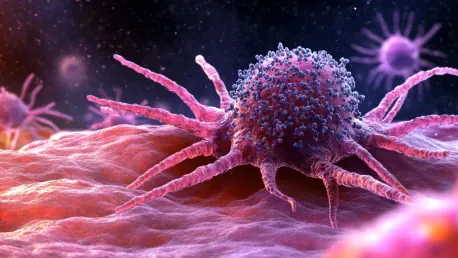The groundbreaking research conducted by Van Andel Institute scientists sheds new light on how developmental epigenetic changes can profoundly influence cancer risk later in life. The study, published in Nature Cancer, identifies two distinct epigenetic states formed during development, which are linked to varying lifetime cancer risks. Historically, cancer has been viewed predominantly as a genetic disease arising from DNA mutations accumulated over a lifetime. However, this research shifts the focus towards developmental epigenetics, proposing that early developmental states significantly influence future cancer risk. This paradigm shift paves the way for novel research avenues into the foundational mechanisms of cancer.
Epigenetic States and Cancer Risk
Lower and Higher Risk Epigenetic States
The study highlights that one epigenetic state is associated with a lower lifetime risk of cancer, where potential malignancies are more likely to manifest as liquid tumors such as leukemia or lymphoma. In contrast, the other state is linked to a higher cancer risk, with a predisposition towards developing solid tumors like lung or prostate cancer. These distinctions in epigenetic states underscore the importance of early developmental changes in determining cancer susceptibility.
Cancer generally becomes more prevalent with age due to accumulating DNA damage and other factors. However, not every aberrant cell progresses to cancer. Scientists have increasingly recognized that, beyond genetic mutations, epigenetic errors also play a pivotal role in cancer development. Epigenetics involves the processes that control the activation and timing of DNA instructions, essentially dictating which genes are turned on or off and when. Disruptions in these processes can compromise cellular quality control, allowing diseased cells to persist and proliferate.
Influence of Developmental Epigenetics
The study’s co-corresponding author, Dr. J. Andrew Pospisilik, emphasizes that these findings challenge traditional views by highlighting the role of epigenetics in cancer risk. The research revealed that mice with reduced Trim28 gene levels exhibited two distinct epigenetic patterns on cancer-related genes. These patterns, established during development, determine the subsequent cancer risk states. Such revelations shift the lens from solely genetic mutations to incorporating the significant impact of developmental epigenetic changes in cancer susceptibility.
Co-author Dr. Ilaria Panzeri adds that while some cancer cases may appear to be due to “bad luck,” this concept doesn’t fully explain the variability in cancer development among individuals. Importantly, where ‘bad luck’ cannot be therapeutically targeted, epigenetics can be. By understanding and potentially modifying these developmental epigenetic states, new diagnostic and therapeutic approaches could emerge. This research presents a revolutionary perspective by identifying the epigenetic landscapes formed during development that contribute to life-long cancer risk, offering hope for innovative prevention and treatment strategies.
Broader Implications and Future Research
Widespread Presence of Epigenetic States
The researchers discovered the presence of distinct epigenetic states across various body tissues, suggesting a widespread relevance of developmental epigenetic risk across different cancer types. Their future work aims to investigate the specific impacts of these states on individual cancer types, offering further insights into the intricate interplay between development and cancer susceptibility. This discovery widens the horizon for cancer research, emphasizing the necessity to consider developmental epigenetic factors when assessing cancer risks and devising preventive measures.
This new approach underscores the significance of early developmental stages in shaping the epigenetic landscapes that contribute to cancer susceptibility later in life. The study illuminates the potential for identifying tissue-specific epigenetic markers that could predict an individual’s risk for certain cancers. Future research delving into the mechanisms by which these epigenetic states are established and maintained could reveal novel targets for cancer prevention and treatment. These advancements could dramatically alter the landscape of oncology by providing new tools for early detection and intervention.
Pathways for Diagnosis and Treatment
The pioneering research undertaken by Van Andel Institute scientists illuminates how developmental epigenetic changes can significantly impact cancer risk later in life. This study, featured in Nature Cancer, pinpoints two distinct epigenetic states established during development that are associated with different lifetime cancer risks. Traditionally, cancer has been understood primarily as a genetic disease caused by DNA mutations accumulating over time. However, this research shifts the focus to developmental epigenetics, suggesting that early developmental states play a crucial role in determining future cancer risk. This shift in perspective opens up new research opportunities to explore the fundamental mechanisms of cancer in ways previously not considered. Consequently, this study not only adds a new layer of understanding to cancer biology but also challenges long-held beliefs about the origins of cancer, potentially leading to innovative prevention and treatment strategies in the future.









